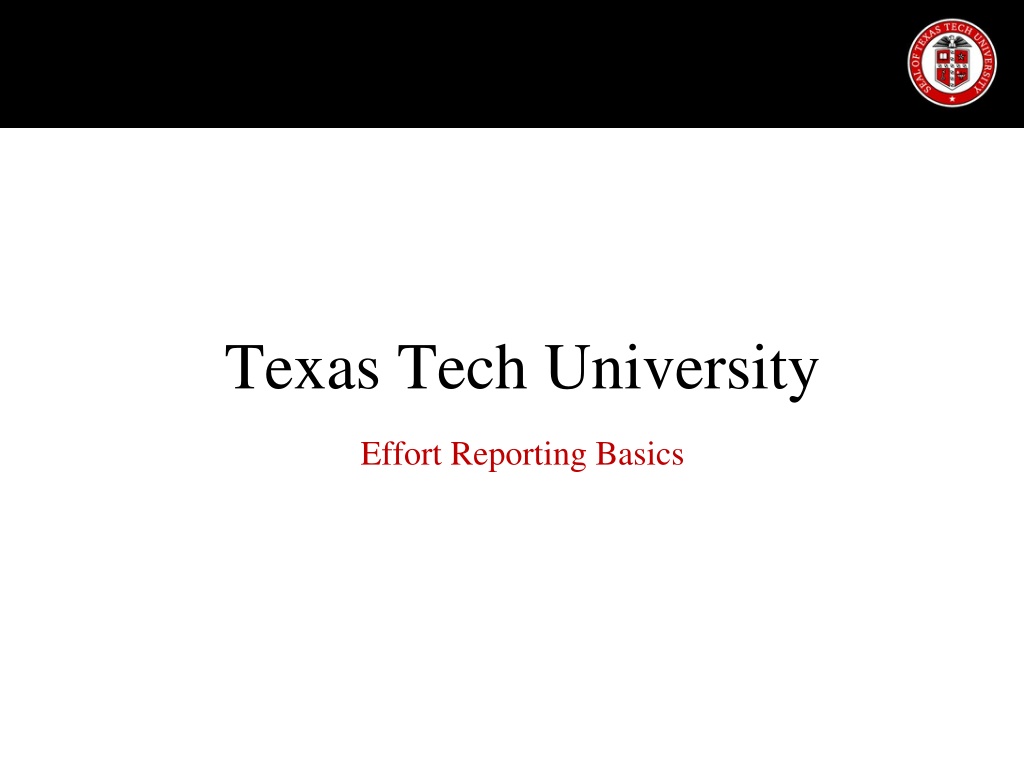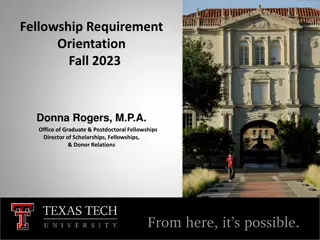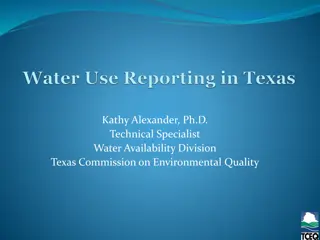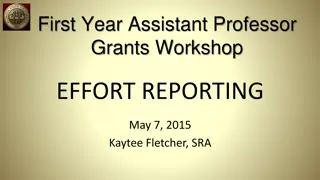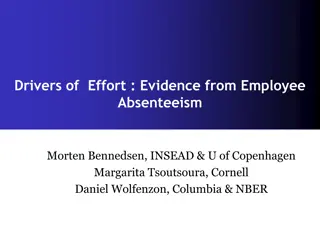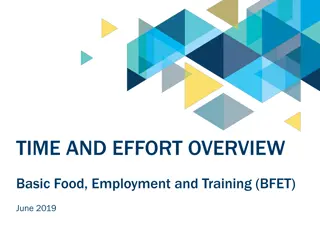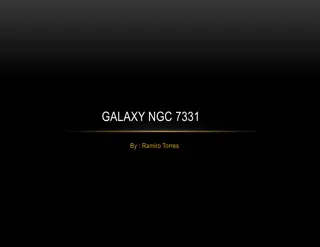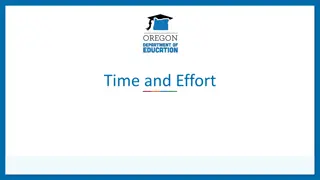Texas Tech University Effort Reporting Basics
Effort reporting at Texas Tech University is crucial for accurately reflecting the time spent on professional activities. Effort is defined as a percentage of total professional activity and must be supported by suitable means of verification. Institutional Base Salary (IBS) is the annual compensation for all professional responsibilities, excluding fringe benefits and supplemental compensation. Intra-University consulting and training requirements for key personnel ensure compliance with federal regulations.
- Texas Tech University
- Effort Reporting
- Institutional Base Salary
- Intra-University Consulting
- Training Requirements
Download Presentation

Please find below an Image/Link to download the presentation.
The content on the website is provided AS IS for your information and personal use only. It may not be sold, licensed, or shared on other websites without obtaining consent from the author. Download presentation by click this link. If you encounter any issues during the download, it is possible that the publisher has removed the file from their server.
E N D
Presentation Transcript
Texas Tech University Effort Reporting Basics
Effort Defined Effort is the portion of time spent on a given professional activity and expressed as a percentage of the total professional activity for which an individual is employed by TTU. Important points: The government recognizes that it is a reasonable estimate Must be performed with suitable means of verification Total effort must equal 100% Effort is not based on a standard (e.g., 40-hour) work week, instead it is based on whatever time is worked 100% Effort includes all professional activities related to the individual s TTU appointment (teaching, research, service) Effort does not include outside activities (e.g., external consulting) 2
Institutional Base Salary (IBS) Definition Institutional base salary (IBS) is the annual compensation paid by the University for all professional responsibilities of the position, including research, instruction, administration, service, or other institutional activities. IBS is the annual salary of the employee s base appointment, plus any additional supplements for recurring, long-term activities (e.g., department chair). IBS excludes fringe benefits, reimbursed expenses, and supplemental compensation for additional work. IBS cannot be increased as a result of replacing institutional salary funds with sponsored project funds. IBS and Effort IBS should be used when proposing, charging, and cost sharing salaries to sponsored projects. 3
Intra-University Consulting Since intra-University consulting is assumed to be undertaken as a university obligation requiring no compensation in addition to full time base salary, the principle also applies to faculty members who function as consultants or otherwise contribute to a sponsored agreement conducted by another faculty member of the same institution. Regulations & Institutional Policy Federal Register 2 CFR Part 200.430 Section h.3, sets forth limited circumstances in which extra compensation above the base salary are allowable Work must be across departmental lines or pertain to a separate or remote operation Work must be in addition to regular departmental load Arrangement must be approved in writing by the sponsor Texas Tech University Operating Policy 70.16, Compensation in Excess of Base Salary, extends Federal requirements to State and private sponsored projects. Additionally, institutional policy limits the amount of additional pay to an amount that is commensurate with the employee s IBS. Intra-University Consulting and Effort Additional compensation paid in accordance with Federal Register 2 CFR Part 200.430 Section h.3 is excluded from IBS and effort certification requirements. 4
Training Requirements PIs, Department Chairs/Directors and Deans Complete online training through SumTotal upon appointment Renewal training every 3 years (was 2 years) Registered by Accounting Services at the beginning of each month Training must be completed within 30 days of registration Employees will receive automated emails once they are enrolled and reminders at 15, 30, and 45 days Escalations as prescribed in OP 65.02 Effort Coordinators Must complete classroom/in-person training session given by Accounting Services to gain access to eCRT system
Role of the Principal Investigator (PI) The Principal Investigator is the steward of the sponsored project and accompanying funds. The University is legally responsible to the sponsor, but the PI is held accountable for the proper fiscal management and conduct of the project. PI responsibilities include: Scientific performance of the work related to the project. Management of the project within funding limitations and in compliance with Federal regulations, sponsor requirements, and institutional policy. This includes effort certification for all personnel on the project. Sponsor notification when change of scope to the project occurs. Responsibility for the day-to-day management of project finances may be delegated to administrative or other staff. However, accountability for compliance with Federal regulations, sponsor requirements, and institutional policy, ultimately rests with the PI. 6
Effort Certification Effort Certification is a Federal requirement. Federal Register 2 CFR Part 200 Section i.8, Standards for Documentation of Personnel Expenses, states that the Federal government may require personnel activity reports where records do not meet standards. Personnel is typically the most significant direct cost component of sponsored project costs and as such, is a focus of Federal auditors. Effort certification is an Institutional requirement. University OP 65.02: Effort Commitment and Certification, requires all employees who receive salary support from sponsored projects (federal, state, or private), or who expend committed effort on a sponsored project without receiving salary support from the sponsor, must certify effort. TTU utilizes the eCRT system for Effort certification. Effort certification documents that salary charged to a project is consistent with the level of effort provided during a specific time period. Effort certification is the primary means of verifying that: Effort supported and charged to the project has been performed as committed, and Effort expended in support of a project but not paid by the project (cost sharing) has been performed as committed.
Effort Certification Effort reports may pre-populate total percentages of payroll distributions to be used as a starting point, since it is often assumed that payroll distribution is monitored and revised based on effort expended. However, these percentages may need to be revised during certification based on actual expended effort. This after-the-fact confirmation is necessary for compliant effort reporting
Reasonable Estimate Sponsors recognize that the activities constituting effort are often difficult to separate. Effort certification must often rely on a reasonable estimate of effort, and when estimating, a degree of tolerance is appropriate. TTU recognizes this as well and allows for 5% variance between certified effort and salary drawn from a sponsored project; however, effort should be estimated as accurately as possible. Examples: It would be reasonable for a faculty member who was awarded and expended 40% effort on a grant to sign an effort report stating 39% payroll support for that grant. It would not be reasonable for a faculty member who teaches two classes to certify that she worked 95% on sponsored projects. 9
Suitable Means of Verification Federal regulations require certification to be made by someone with suitable means of verification. Who has suitable means of verification? The employee, PI, or other responsible official Certification should NOT be performed by the departmental effort coordinator, business manager, or other administrative support personnel. What are suitable means of verification? The individual should have some documentation of how the time was spent that is certified. Documentation could be in the form of an email, calendar, project reports, etc. Payroll records or reports are NOT suitable means of verification. 10
The Context of Effort Reporting Effort Reporting encompasses more than just certifying effort Preparing the Proposal Budget Appointing Faculty & Staff Charging Salary Certifying Effort Salary is charged (or cost shared), consistent with activity. Adjustments may be made, timely after- the-fact. Employment terms are established. Effort is proposed; a commitment is made to the sponsor. Effort is attested to, after activity has occurred (adjustments to salary distribution may be made if effort < salary%). 11
Key Effort Reporting Concepts Important concepts to consider with respect to effort reporting include: Who must complete an effort report? Who should sign effort reports? Cost sharing Summer salaries Labor Redistributions 12
Who is Required to Certify? Per federal regulation, each individual paid from a sponsored project is required to have an effort report completed and certified on file Federal regulations state effort reports should be certified by: An employee, principal investigator or other responsible official with first- hand knowledge of an employee s effort on the certifier s sponsored project, or Students working on multiple sponsored projects might require certification by multiple certifiers. An individual who used suitable means of verifying that the work was performed. TTU effort reports will be certified as follows: Each PI and faculty member will self-certify. PIs will certify for all non-faculty paid from their projects. PIs may choose another faculty member on the project as a designee to certify for non-faculty if the designee has more adequate means of verification. 13
Cost Share and Salary Caps Cost Sharing Definition: A commitment of TTU resources or funding that supports externally sponsored projects. Voluntary Uncommitted cost sharing occurs when effort exceeds the payroll charged to a particular project. This type of cost share is neither pledged in the proposal nor stated in the award documents. Example - A PI is paid 50% from the sponsored project, 50% from University funds and certifies to 80% effort on the project and 20% effort on the non-sponsored funds. These costs are not reimbursed by the sponsor (will not be charged to the sponsored project) and therefore must be supported by TTU funds. Cost shared effort should be included in the effort report Mandatory cost sharing Required by sponsor, quantified in proposal Voluntary cost sharing Not formally required by sponsor, but becomes mandatory when included in the proposal and the proposal is accepted 14
Summer Salary A faculty member s summer salary rate cannot exceed the base salary divided by the period to which the base salary relates (e.g., monthly rate for summer salary = no more than 1/9 of academic year salary) Charges for summer sponsored research activities must be consistent with the level of effort provided during that time period. It is not compliant with federal regulations or institutional policy for an individual who is absent from research for a substantial period of the summer session to charge three full months of summer salary to sponsored research and report 100% research activity on effort reports. It is not compliant with federal regulations or institutional policy for an individual to do any other work besides that on the sponsored award, if the full (three summer months ) salary is being charged to the sponsored award for that period of time Individuals should not be preparing teaching materials, writing proposals, working on other research projects, or performing any administrative tasks over this time period. 15
Labor Redistributions The differences between certified effort % and % of salary charged may require a resulting labor redistribution. It is important that the salary charged to a sponsored project not exceed the effort spent on the project. If the salary charged is greater than the effort expended, a labor redistribution should be done to remove salary charged to the sponsored project. Once effort has been certified, subsequent labor redistributions to move salary charges on or off of sponsored project funds will be closely scrutinized and must be accompanied by information requested on the Accounting Services Form included with the Labor Redistribution. Labor Redistributions, which will also require the Accounting Services Form, must be submitted by the Effort Coordinator and will require PI approval. Labor redistributions represent cost transfers to, from, and/or among grants. As such, the timeliness of the transfers must comply with TTU OP 65.04, Cost Transfers. Any transfers of labor costs TO sponsored projects after 90 days will be closely scrutinized and will require justification. 16
Penalties for False Certification False Claims Act Those who knowingly submit, or cause another person or entity to submit, false claims for payment of government funds are liable for three times the government s damages plus civil penalties of $5,500 to $11,000 per false claim.
Certification Timeline Effort must be certified on a semi-annual basis within 45 days of when the statement becomes available. Certification windows: Period of Performance Certification Window Jan 1 - June 30 July 16 - August 29 July 1 - December 31 January 16 - March 1 If effort is not certified within 60 days of when the statement becomes available, the Vice President for Research and the Provost will be notified and further action may be taken. 1 8
Consequences for Non-Compliance To protect the interests of the University and ensure compliance with Federal regulations, the following escalation procedures will be followed: 30 after the statement becomes available, the Department Chair will be notified 45 days after the statement becomes available, the College Dean will be notified 60 days after the statement becomes available, the Vice President for Research and the Provost will be notified Possible consequences of non-compliance after the 60 day period include: ORS will not submit proposals or execute award agreement on behalf of the faculty member Accounting Services will deactivate current sponsored project funds Further disciplinary actions in accordance with University policy 1 9
Points of Contact All questions related to appointments, accounts, percentages, amounts and/or the eCRT system should be directed to your departmental Effort Coordinator. For additional assistance, contact Accounting Services (AS). Brad Sims, Compliance Coordinator, (806) 834-3606 or at brad.sims@ttu.edu 2 0
